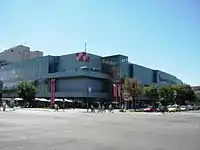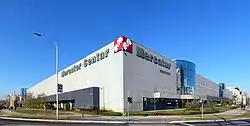Mercator (retail)
Mercator (pronounced [mɛɾˈkaːtɔɾ]; Latin for 'merchant') is a Slovenian multinational retail corporation owned by the Croatian company Agrokor that is operating in the Central and Southeast Europe.
 | |
| Type | Joint-stock company |
|---|---|
| Industry | Retail |
| Founded | 1949 |
| Headquarters | Ljubljana, Slovenia |
Number of locations | 1,051 stores (2018)[1] |
Area served | Slovenia, Southeast Europe |
Key people | Tomislav Čizmić (CEO) |
| Products | Cash & carry, convenience store, discount store, e-commerce, hypermarket, supermarket |
| Brands | Mercator |
| Services | Food, tourism, fuel |
| Revenue | |
| Total assets | |
| Total equity | |
| Owner | [[1. Agrokor d.d. Croatia 4,237,376 69.57% 2. Clearstream banking SA – fiduciary account/Sberbank of Russia Luxembourg 1,129,058 18.54 % 3. Societe Generale-Splitska Banka, d.d. Croatia 410,339 6.74% 4. Addiko bank, d.d. - fiduciary account Croatia 172,755 2.84% 5. Other 141,415 2,31%]] (100%) |
Number of employees | 20,310 (2018)[1] |
| Website | Corporate website |
Poslovni sistem Mercator d.d. is one of the largest business entities in Slovenia and the parent company of the Mercator Group. As the Mercator Group's controlling company, it has a double role: it manages its retail operations, and carries out corporate tasks for other Mercator Group companies. In addition to its domestic market of Slovenia, Mercator Group is also present in Serbia, Montenegro, Bosnia and Herzegovina, Croatia, and North Macedonia. Mercator Group's core activity is fast-moving consumer goods retail in an extensive retail network spanning Slovenia, Serbia, Montenegro, and Bosnia and Herzegovina.
Mercator's story dates back to 1949, when the wholesale company Živila Ljubljana, the predecessor of the present-day Poslovni sistem Mercator d.d., was founded. In the early days, Mercator sold the goods straight from the warehouse; today, it is among the most modernized retailers in the region.
History
1949–2000
Mercator was founded in 1949 under the name "Ljubljana Groceries" (Slovene: Živila Ljubljana),[2] and four years later it was given its current name, Mercator. The first director of the firm was Adolf "Adi" Osterc (1918–2014),[3] who served in the Partisans' Gubec Brigade during the Second World War[4] and then carried out political arrests after the war.[5] The company operated only in Slovenia until the 1990s, and later started opening retail stores in other countries in the Balkans, with future plans to spread on markets outside the territories of the former Yugoslavia.
2000–2014: Regional expansion
Mercator entered retail markets of Croatia and Bosnia and Herzegovina in 2000, Serbia in 2002, North Macedonia in 2005, and Montenegro in 2007. At the end of 2009, Mercator opened stores in Tirana, Albania, and Stara Zagora, Bulgaria. While also planning on opening seven other shopping centers in Bulgaria,[6] Mercator considered exiting the Bulgarian market by 2013. In 2012, Mercator also planned to withdraw from the Albanian market; after which it closed the two stores located in the largest Albanian cities of Tirana and Durrës, in January 2013.
2014–2017: Agrokor's takeover
To pay off its debt, Slovenian shareholders agreed to Croatian Agrokor acquiring a 53.1% stake in Mercator in late June 2014,[7] and additional 27.6% of the company shares in early September, 2014; leading to vast closure of Mercator stores in Croatia and Bosnia, and acquirement of nearly an equal amount of additional stores in Serbia. Due to the absence of a final decision from the Bosnian Competition Council, Konzum only in BiH was not obliged to sell or rent any of the retail stores inherited by merging with Mercator BiH (Mercator shopping centers and DP markets). Konzum is, in some parts of the country, gained almost a monopoly position.[8]
2017–present
After the outbreak of the Agrokor debt crisis in 2017 and the subsequent corporate restructuring, 83 Konzum stores in Bosnia were rebranded as Mercator stores, while the other 173 stores the company owned continued to operate under the name Konzum.[9]
However, because of Konzum's debts, Mercator returned to Bosnia and Herzegovina in September 2017. It took over 83 out of Konzum's 258 stores. After that, Konzum lost its title of the biggest supermarket chain in Bosnia and Herzegovina. As of 31 December 2018, Mercator has 1,051 retail units, with most of the revenues coming from Slovenia (56.1%) and Serbia (32.6%).[1]
Operating divisions
While Mercator's primary market remains in Slovenia, it is also operating its retail chain in Croatia, Bosnia and Herzegovina, Serbia, and Montenegro.
Poslovni sistem Mercator d.d. is the largest trading company in Slovenia. Including its franchise stores, it operates a total of 715 units (as at September 30, 2018). The company's core activity is retail of fast-moving consumer goods, while technical consumer goods (M Tehnika) and wholesale (Cash & Carry) are a separate business area. In addition, Mercator also operates two independent manufacturing companies in Slovenia – Mercator–Emba d.d., and Mercator IP d.o.o. – and it owns a self-service gas station company Maxen.
In Slovenia, Mercator is recognized as a national player, owing to the extent of its retail network and convenient location of its stores. Customers also appreciate the breadth of Mercator's offer and the largest offer of local products. Popularity and the widespread use of the Pika customer loyalty card that is used by virtually every Slovenian household demonstrate that Mercator has a special place with Slovenian consumers.
In addition to having the longest-standing tradition, Mercator is in many ways also a leader in terms of new developments. It was the first fast-moving goods retailer in Slovenia to operate an online store, the first one to offer self-checkout, the first one to offer shopping with mobile applications M Scan and M Scan Mobile, and it was the first retailer to develop a mobile platform called "Moj M" that also includes a mobile wallet "M Pay".
Mercator is constantly introducing innovative solutions to its services and its offer, gradually changing and upgrading them, and adjusting them to the actual needs of the customers, while replacing others with new ones. Thus, it is improving both the shopping experience and its efficiency, so that it can offer the customers what they need and desire, and what represents added value for them. As a result, it is developing a store tailored to the customers.
In addition to Slovenia, Mercator operates as a local retailer in three other markets in the region: Serbia, Montenegro and Bosnia Herzegovina.
Serbia
The first Mercator store was opened in Belgrade, in 2002. Today, the company has stores in many Serbian cities, including Belgrade[10] and Novi Sad. An upscale supermarket in the basement of the Beograđanka skyscraper was originally branded Mercator Premium, but it was rebranded to Idea after Agrokor's acquisition of Mercator. Some of the chain's other stores in Serbia are named Roda. As of 31 December 2018, Mercator has 321 retail stores in Serbia.[1]
Montenegro
Mercator entered Montenegro's market in 2007.[11] As of 2018, the retail chain is running stores under the Idea banner. As of 31 December 2018, Mercator has 117 retail stores in Montenegro.[1]
Bosnia and Herzegovina
Mercator opened the first store in Sarajevo, in 2000, and later several additional hypermarkets, supermarkets, and convenience stores in Bosnia and Herzegovina.[12] All Mercator BH stores were transferred to Konzum in late 2014.[8] However all 83 Mercator BH stores were retransferred from Konzum to Mercator during September 2017. As of 31 December 2018, Mercator has 77 retail stores in Bosnia and Herzegovina, of which 50 are markets, 16 supermarkets and 11 hypermarkets.[1]
Croatia
Mercator opened the first store in Pula, in 2000; following with establishment of over 40 hypermarkets and supermarkets, and many more convenience stores in Croatia.[13] Following Agrokor's acquisition of Mercator, most stores were leased out to Konzum or closed down in late 2014, while the company Mercator H d.o.o., Croatia, has retained its real estate management operations.
See also
References
- "Annual Report 2018" (PDF). mercatorgroup.si. Retrieved 29 September 2019.
- "Mercator Group, History". Mercator. Retrieved March 16, 2015.
- Mekina, Borut. 2008. Miran Goslar, oče Mercatorja. Mladina 46 (13 November).
- Iskanje srednjeveškega pokopališča v Mirni Peči. 2014.
- Makovec, Urška. 2015. Ferdreng – nepoznano žensko delovno taborišče na Kočevskem. Siol.net (13 September).
- Lipnik, Karel (June 15, 2009). "Mercator se za prodor v Bolgarijo pogaja z Grki". Finance.
- "Croatian retailer Agrokor seals takeover of Slovenian rival Mercator". Reuters. June 26, 2014.
- "Hoće li Todoriću biti omogućen monopol u BiH?" (in Bosnian). www.klix.ba. klix.ba. 14 March 2014. Retrieved 4 January 2016.
- "Razdvojeni Konzum i Mercator u BiH". Al Jazeera Balkans. 2017-08-31.
- "Otvoren renovirani Merkator". B92. September 1, 2012.
- "Mercator enters Montenegro market". B92. November 30, 2007. Archived from the original on April 2, 2015.
- "Prodajna mesta (BiH, BL)". Mercator. Archived from the original on November 27, 2013. Retrieved March 21, 2013.
- "Prodajna mesta (Croatia)". Mercator. Archived from the original on May 18, 2012. Retrieved March 21, 2013.


